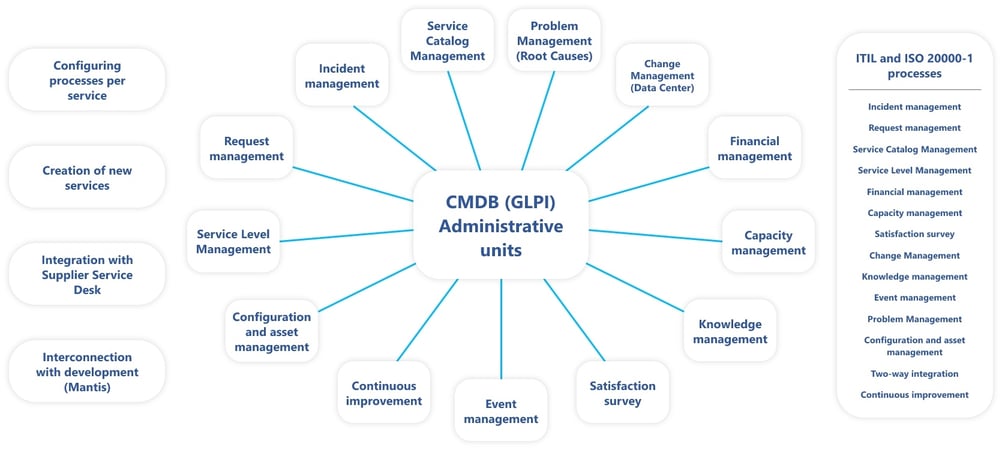ITSM GLPI
GLPI is the most complete Open Source Service Management Software.


GLPI Intelligent Service Desk
It is the implementation, configuration and support service for a service desk to resolve incidents and requests, aligned to ITIL best practices, using GLPI, with proactive monitoring and identifying root causes, to create innovation strategies to transform your digital business.
Working Groups for the definition of Service Catalogs.
- Staff Satisfaction Surveys
- Self-Service Portal
- Integration with executive dashboards in KIBANA
- Integration with development area with MANTIS BT
- Integration with monitoring systems such as zabbix, datadog, PRTG
- Service on premise or in the cloud in Managed Service
- Security scheme based on iso 27001
- Manufacturer support
- Training to the 3 user profiles: Administrators, Operators and Users
Aligned to ITIL and ISO 20000 processes.

Management of Information Technology, ICT's in GLPI
Incidents
An incident refers to any event that is not part of the normal operation of a service and causes an interruption or reduction in the quality of service.

Requests
A request refers to a request made by the user for help, information or a service.
.png)
Problems
Problems are underlying issues that cause one or more incidents.
CMDB and assets
CMDB is a powerful tool to manage and maintain a detailed inventory of all IT assets.

Financial management
The process of controlling and monitoring costs and budgets associated with IT assets and related services.

KPI Metrics
KPI (Key Performance Indicators) metrics are essential tools to measure and evaluate the performance of technical support and IT service management.
.png)
Administration
Variety of roles and responsibilities that ensure the efficient and effective operation of the system.

Plugins
Add-ons that allow extending and customizing the functionalities of the base system according to the needs of an organization.

Portal of automatic service, self-service in GLPI
Service Catalogs
Functionality that allows organizations to define, publish and manage the IT services they offer to their users.
Surveys
Surveys are a powerful tool to collect valuable feedback from users about the IT services provided.
News
Dissemination of relevant information, updates or important announcements within the system.
Categories and templates
Categories and templates play an important role in the organization and structuring of data, in contexts such as asset management, service management and incident management.
Service Catalogs
Functionality that allows organizations to define, publish and manage the IT services they offer to their users.
Surveys
Surveys are a powerful tool to collect valuable feedback from users about the IT services provided.
News
Dissemination of relevant information, updates or important announcements within the system.
Categories and templates
Categories and templates play an important role in the organization and structuring of data, in contexts such as asset management, service management and incident management.
Self-help
Ability of end users to solve their problems or requests on their own without the need for direct intervention from the support team.
Forms
They play a crucial role in structured data capture and efficient process management.
End user
In GLPI, an "end user" typically refers to those employees or members of an organization who use the system to perform tasks related to IT asset management.
Integrations with delegated systems, portals in GLPI

Integrations
The process of connecting and coordinating different systems, applications or services so that they work together in a coherent and efficient manner.

GPT AI Chat
Integrating ChatGPT AI with GLPI can enhance the user experience by providing automated responses, real-time assistance and facilitating ticket management.
.png)
Elasticsearch Dashboard
It is a visual interface that allows users to interact and visualize data. These dashboards are commonly created and managed through kibana, the official data visualization tool for Elasticsarch.
.png)
Development Incidents
Problems, errors or unexpected situations that may arise during the development process. MantisBT will allow development and project management teams to keep detailed track of all issues.

GLPI AD
Integration of the GLPI IT management system with Microsoft's Active Directory (AD), an integration that allows GLPI to authenticate and synchronize users and groups directly from the AD.

Notifications via Mail
GLPI allows the configuration of e-mail notifications to keep users and technicians informed about events and changes in the IT management system.
-1.png)
Interoperability via API
GLPI allows you to automate asset management tasks, ticket management, user management, between different service desks.
-1.png)
Ticket Tracking through Teams
Integrating GLPI with Microsoft Teams allows you to manage tickets and follow-ups efficiently from both platforms.

Follow-up via Telegram
Integrating Telegram with your ticket management system offers flexibility and accessibility, allowing you to keep your team informed and facilitating efficient communication about incidents and their resolution.
.png)
Webhook Zabbix Integration
Integrating Webhooks between Zabbix and GLPI will allow you to automate the creation of tickets in GLPI based on Zabbix events, such as problems or alerts.
| More information | Demo |
|---|---|
If you need more information about the solution, we are here to help you and make your processes more efficient. |
